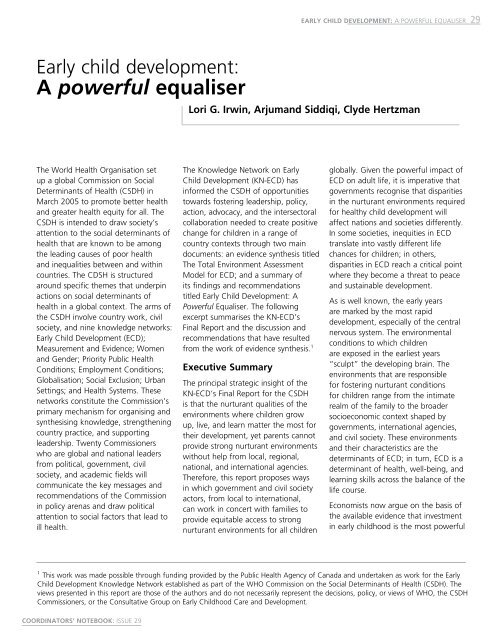A global call to action for early childhood
A global call to action for early childhood
A global call to action for early childhood
You also want an ePaper? Increase the reach of your titles
YUMPU automatically turns print PDFs into web optimized ePapers that Google loves.
Early child development: A powerful equaliser<br />
29<br />
Early child development:<br />
A powerful equaliser<br />
Lori G. Irwin, Arjumand Siddiqi, Clyde Hertzman<br />
The World Health Organisation set<br />
up a <strong>global</strong> Commission on Social<br />
Determinants of Health (CSDH) in<br />
March 2005 <strong>to</strong> promote better health<br />
and greater health equity <strong>for</strong> all. The<br />
CSDH is intended <strong>to</strong> draw society’s<br />
attention <strong>to</strong> the social determinants of<br />
health that are known <strong>to</strong> be among<br />
the leading causes of poor health<br />
and inequalities between and within<br />
countries. The CDSH is structured<br />
around specific themes that underpin<br />
<strong>action</strong>s on social determinants of<br />
health in a <strong>global</strong> context. The arms of<br />
the CSDH involve country work, civil<br />
society, and nine knowledge networks:<br />
Early Child Development (ECD);<br />
Measurement and Evidence; Women<br />
and Gender; Priority Public Health<br />
Conditions; Employment Conditions;<br />
Globalisation; Social Exclusion; Urban<br />
Settings; and Health Systems. These<br />
networks constitute the Commission’s<br />
primary mechanism <strong>for</strong> organising and<br />
synthesising knowledge, strengthening<br />
country practice, and supporting<br />
leadership. Twenty Commissioners<br />
who are <strong>global</strong> and national leaders<br />
from political, government, civil<br />
society, and academic fields will<br />
communicate the key messages and<br />
recommendations of the Commission<br />
in policy arenas and draw political<br />
attention <strong>to</strong> social fac<strong>to</strong>rs that lead <strong>to</strong><br />
ill health.<br />
The Knowledge Network on Early<br />
Child Development (KN-ECD) has<br />
in<strong>for</strong>med the CSDH of opportunities<br />
<strong>to</strong>wards fostering leadership, policy,<br />
<strong>action</strong>, advocacy, and the intersec<strong>to</strong>ral<br />
collaboration needed <strong>to</strong> create positive<br />
change <strong>for</strong> children in a range of<br />
country contexts through two main<br />
documents: an evidence synthesis titled<br />
The Total Environment Assessment<br />
Model <strong>for</strong> ECD; and a summary of<br />
its findings and recommendations<br />
titled Early Child Development: A<br />
Powerful Equaliser. The following<br />
excerpt summarises the KN-ECD’s<br />
Final Report and the discussion and<br />
recommendations that have resulted<br />
from the work of evidence synthesis. 1<br />
Executive Summary<br />
The principal strategic insight of the<br />
KN-ECD’s Final Report <strong>for</strong> the CSDH<br />
is that the nurturant qualities of the<br />
environments where children grow<br />
up, live, and learn matter the most <strong>for</strong><br />
their development, yet parents cannot<br />
provide strong nurturant environments<br />
without help from local, regional,<br />
national, and international agencies.<br />
There<strong>for</strong>e, this report proposes ways<br />
in which government and civil society<br />
ac<strong>to</strong>rs, from local <strong>to</strong> international,<br />
can work in concert with families <strong>to</strong><br />
provide equitable access <strong>to</strong> strong<br />
nurturant environments <strong>for</strong> all children<br />
<strong>global</strong>ly. Given the powerful impact of<br />
ECD on adult life, it is imperative that<br />
governments recognise that disparities<br />
in the nurturant environments required<br />
<strong>for</strong> healthy child development will<br />
affect nations and societies differently.<br />
In some societies, inequities in ECD<br />
translate in<strong>to</strong> vastly different life<br />
chances <strong>for</strong> children; in others,<br />
disparities in ECD reach a critical point<br />
where they become a threat <strong>to</strong> peace<br />
and sustainable development.<br />
As is well known, the <strong>early</strong> years<br />
are marked by the most rapid<br />
development, especially of the central<br />
nervous system. The environmental<br />
conditions <strong>to</strong> which children<br />
are exposed in the earliest years<br />
“sculpt” the developing brain. The<br />
environments that are responsible<br />
<strong>for</strong> fostering nurturant conditions<br />
<strong>for</strong> children range from the intimate<br />
realm of the family <strong>to</strong> the broader<br />
socioeconomic context shaped by<br />
governments, international agencies,<br />
and civil society. These environments<br />
and their characteristics are the<br />
determinants of ECD; in turn, ECD is a<br />
determinant of health, well-being, and<br />
learning skills across the balance of the<br />
life course.<br />
Economists now argue on the basis of<br />
the available evidence that investment<br />
in <strong>early</strong> <strong>childhood</strong> is the most powerful<br />
1<br />
This work was made possible through funding provided by the Public Health Agency of Canada and undertaken as work <strong>for</strong> the Early<br />
Child Development Knowledge Network established as part of the WHO Commission on the Social Determinants of Health (CSDH). The<br />
views presented in this report are those of the authors and do not necessarily represent the decisions, policy, or views of WHO, the CSDH<br />
Commissioners, or the Consultative Group on Early Childhood Care and Development.<br />
COORDINATORS’ NOTEBOOK: ISSUE 29
















